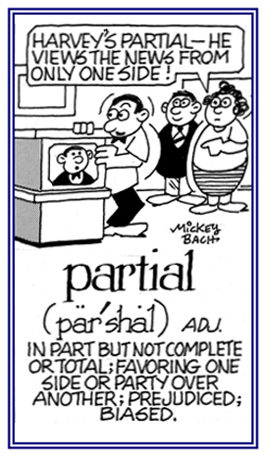part-, parti-
(Latin: part, parts, to divide)
impartial
impartiality
impartially
jeopard
jeopardize (verb), jeopardizes; jeopardized; jeopardizing
To threaten, to endanger, or to hazard: Eileen's health has been jeopardized because of poor nutrition, drinking, and smoking.

© ALL rights are reserved.
Go to this Word A Day Revisited Index

Go to this Word A Day Revisited Index
so you can see more of Mickey Bach's cartoons.
1. A hazard, a risk of sever injury, or an exposure to loss, to harm, or to death: One's health is in jeopardy when smoking cigarettes, drinking alcohol, and consuming drugs.
2. A source of danger or a possibility of incurring misfortune: Jack was in jeopardy because of the precariousness of hiking alone in the mountains with the wrong shoes and nothing to drink.

© ALL rights are reserved.
Go to this Word A Day Revisited Index
2. A source of danger or a possibility of incurring misfortune: Jack was in jeopardy because of the precariousness of hiking alone in the mountains with the wrong shoes and nothing to drink.

Go to this Word A Day Revisited Index
so you can see more of Mickey Bach's cartoons.
parcel
pars (s), partes (pl)
A part or a portion of a larger structure.
parse
1. In grammar, to divide a sentence, etc. into grammatical parts and to identify those parts and their relations to each other or to state the parts of speech in a sentence.
2. To study or to analyze something by looking at its parts closely: "The reporters tried to parse the economic data to see why the market was going down."
3. to analyze computer input in a specific language against the formal grammar of that language, both to validate the input and to create an internal representation of it for use in subsequent processing.
2. To study or to analyze something by looking at its parts closely: "The reporters tried to parse the economic data to see why the market was going down."
3. to analyze computer input in a specific language against the formal grammar of that language, both to validate the input and to create an internal representation of it for use in subsequent processing.
part
1. A portion, division, piece, or segment of a whole.
2. Any of several equal portions or fractions that can constitute a whole or into which a whole can be divided.
3. Etymology: from part a "division of a whole, a portion"; borrowed from Old French part, from Latin pars, partis, "part".
2. Any of several equal portions or fractions that can constitute a whole or into which a whole can be divided.
3. Etymology: from part a "division of a whole, a portion"; borrowed from Old French part, from Latin pars, partis, "part".
partakable (adjective) (not comparable)
Able to participate in an activity or meal: All the food on the table at the party is tasty, partakable, and can be enjoyed by everyone!
partake
partaker
partes aequales; part. aeq.
Equal parts or in equal parts.
partial (adjective), more partial, most partial
1. Relating to being incomplete: Adam's recent dramatic production is considered to be only a partial success by the critics.
2. A reference to favoritism, where one side is more preferred than another side in an unfair way; biased: Referees must not have partial judgements for either of the competing teams when they contend with each other in sports.
3. Etymology: from Latin partialis, "divisible, solitary"; from pars "part" + -al, "similar to, related to".

© ALL rights are reserved.
Go to this Word A Day Revisited Index
2. A reference to favoritism, where one side is more preferred than another side in an unfair way; biased: Referees must not have partial judgements for either of the competing teams when they contend with each other in sports.
3. Etymology: from Latin partialis, "divisible, solitary"; from pars "part" + -al, "similar to, related to".



